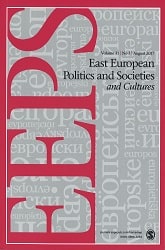Modernization Theory Revisited: The Case of Bulgaria
Modernization Theory Revisited: The Case of Bulgaria
Author(s): Rossen VassilevSubject(s): Political history, Government/Political systems, Political economy, Economic development, WW II and following years (1940 - 1949), Post-War period (1950 - 1989), Transformation Period (1990 - 2010), History of Communism, Post-Communist Transformation, Socio-Economic Research
Published by: SAGE Publications Ltd
Keywords: Bulgaria; modernization; postwar period; communist regime; transition to democracy; socio-economic development; accelerated economic growth; 1945-1989; democratic revolution;
Summary/Abstract: Before starting its rocky transition to democracy, Bulgaria was one of the economically more successful Soviet-bloc nations. Its postwar social and economic record supports the insights and lessons of modernization theory. The Bulgarian case attests to the causal relationship between socio-economic development and political democratization. Between 1945 and 1989, the communist government modernized Bulgaria through a combination of accelerated economic growth, industrialization, urbanization, and mass education. The postwar Bulgarian economy was transformed from an overwhelmingly rural and agricultural one to a predominantly urban-industrial and service economy. [...]
Journal: East European Politics and Societies
- Issue Year: 13/1999
- Issue No: 03
- Page Range: 566-599
- Page Count: 34
- Language: English
- Content File-PDF

